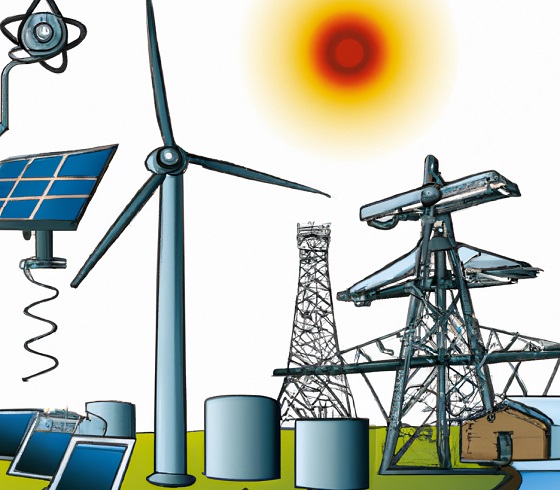By Pierre Gilbert
Before we collectively devastate our economies, further reduce our birth rates in a misguided attempt to save the planet, squander trillions of dollars, and halt human progress by making energy both scarce and exorbitantly expensive, it’s crucial to remember that human-induced climate change is not a settled fact, but rather a hypothesis largely unsupported by the history of the climate but supported by climate models that have considerable error built into them.
Canadian Environment Minister Steven Guilbeault recently announced a plan requiring the oil and gas industry to cut CO2 emissions by more than one-third from 2019 levels by 2030. This deadline might seem far off, but it also stipulates that at least 20 percent of light-duty vehicle sales must be zero-emission by 2026, a deadline that’s just around the corner. This is all part of Guilbeault’s strategy to achieve the ambitious net-zero emissions target by 2050.
There are at least ten reasons suggesting that this plan is absurd.
- CO2 is Not a Pollutant.
Carbon dioxide is, in fact, a fertilizer crucial for the growth of all vegetation. Higher concentrations of CO2 result in increased crop yields and more productive forests. Healthier forests, in turn, absorb more CO2, providing oxygen in exchange which is essential for the survival of all living organisms including humans.
- CO2 is a Trace Gas
During my extensive career as a university professor, I encountered numerous students eager to support policies that might devastate the livelihoods of thousands of men and women who depend on the oil and gas industry, believing these sacrifices would save the planet. Their near-religious zeal was only matched by their stunning ignorance of basic CO2 facts.
Class surveys I conducted showed that almost one hundred percent of my students were unaware that CO2 is a trace gas, with its atmospheric concentration having varied significantly over centuries and even seasonally. Currently, CO2 represents about 0.04% of the atmospheric gases, or approximately 420 parts per million (ppm). By comparison, nitrogen makes up about 78%, and oxygen around 21%.
The best estimates suggest that human activities contribute roughly 4% of the total annual CO2 emissions (16 ppm). Canada’s share of global emissions is approximately 1.5% (0.24 ppm), essentially a rounding error in the total calculation.
- Why Alberta and Not China?
It is no secret that Guilbeault harbours a special animosity towards Alberta. His energy regulations appear designed to severely impact Alberta’s economy despite the province being a relatively minor player on the global stage. In contrast, China, by far the largest contributor to global CO2 emissions, builds two new coal-powered (dirty) power plants every week and is the primary beneficiary of Canada’s coal exports. Why doesn’t Guilbeault turn his scornful gaze towards the People’s Republic? Even during his visit to China in August 2023 for climate talks, not only did he overlook that country’s appalling environmental track record, to add insult to injury, while there he critiqued Suncor for recommitting to oil sands development, highlighting a troubling policy double standard.
- Watch What They Do, not What They Say
The economic and cultural elites, who incessantly warn of an impending climate catastrophe, seem to contradict their own claims by their extravagant lifestyles. Their opulent residences, frequent use of private jets, and other extravagances reveal a significant disconnect between their rhetoric and their behaviour, suggesting either hypocrisy or a lack of belief in the very crisis they promote.
- Magical Thinking
When they purport to compel the oil and gas industry to adopt new technologies, politicians and policymakers indulge in a particularly delusional form of magical thinking. First, the industry is already one of the most innovative sectors in the economy. Second, these individuals demonstrate a profound ignorance of both climate change and the complex challenges of energy production. As is typical of low-information politicians, they seem to believe that all they need to do to enact change in line with their utopian ideals is to snap their fingers or twitch their collective nose.
- A Multiplier of Human Misery
All the regulations that politicians like Guilbeault introduce with a regularity that rivals the proverbial cuckoo clock have nothing to do with creating new sources of energy or making energy more accessible and affordable. If they were genuinely concerned about their constituents’ welfare, these politicians would incentivize nuclear energy. But they conspicuously do not. These incessant regulations, taxes, and oppressive energy policies serve one purpose: to inflate energy prices so high that middle-class individuals are forced to drive less, reduce their energy use for heating and cooling their homes, and drastically curbing manufacturing. To the extent that such policies persist, they will impose an increasingly devastating economic burden on the poor and the working class.
- Extreme Weather Events
A radical reduction in CO2 emissions will not only lead to a weaker economy and increased poverty, but it will also diminish our capacity to respond to extreme weather conditions, which will occur regardless of the taxation governments impose on human activities.
- The Used-Car Salesman Syndrome
You know you’re being conned when a used car salesperson fails to mention the downsides of the vehicle being considered. The same skepticism and caution should be applied to politicians who tout only the benefits of their proposed policies without discussing the costs. Either they are blissfully unaware of these costs, or they believe they will be insulated from the real-world repercussions of their harmful policies due to their status, wealth, or connections.
- Anti-Human Perspective
While it’s unwise to gratuitously attribute malicious intent to anyone, the evidence suggests that proponents of radical climate change policies operate from what can only be described as an anti-human perspective. They view human beings as liabilities and parasites rather than, as the Judeo-Christian tradition asserts, the valuable assets they truly are.
- A Matter of Debate
Before we collectively devastate our economies, further reduce our birth rates in a misguided attempt to save the planet, squander trillions of dollars, and halt human progress by making energy both scarce and exorbitantly expensive, it’s crucial to remember that human-induced climate change is not a settled fact, but rather a hypothesis largely unsupported by the history of the climate but supported by climate models that have considerable error built into them.
In conclusion, Bjorn Lomborg, the Danish political scientist and founder of the prestigious Copenhagen Consensus Center—an organization renowned for producing some of the most authoritative studies on environmental issues—wisely reminds us that while there are environmental concerns needing attention, it’s questionable whether climate change constitutes an existential crisis that warrants dedicating all our resources at the expense of human life and flourishing.
Pierre Gilbert is Associate Professor Emeritus at Canadian Mennonite University. He writes here for the Frontier Centre for Public Policy.
Related














